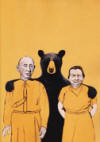Passages North – Winter 2013
This issue of Passages North transports readers in all directions to many destinations where memory is immediate and present and history is imminent and alive. The opening pages are home to the winners and honorably mentioned of the 2012 Fiction Prizes. The winning stories convey readers down corridors of metaphor and into realms of secrecy. Traci Brimhall’s story, “After the Flood the Captain of the Hamadryas Discovers a Madonna,” the winning entry of the short-short fiction category, is a poetic work of prose that clarifies with its ambiguity and wonderment. The opening paragraph immediately draws us in:
This issue of Passages North transports readers in all directions to many destinations where memory is immediate and present and history is imminent and alive. The opening pages are home to the winners and honorably mentioned of the 2012 Fiction Prizes. The winning stories convey readers down corridors of metaphor and into realms of secrecy. Traci Brimhall’s story, “After the Flood the Captain of the Hamadryas Discovers a Madonna,” the winning entry of the short-short fiction category, is a poetic work of prose that clarifies with its ambiguity and wonderment. The opening paragraph immediately draws us in:
He pulled everything he could save out of the water—canoes snarled in tree roots, bruised mangoes, cans of chilies, crates and crates of plantains splitting from their tough yellowed skins—before he found her upside down in a kapok tree, robed in mud and fish bones, a woman’s floral underwear wrapped around her feet.
We know what is happening and we don’t, and in three additional paragraphs we have a story, an allegory, that pushes and pulls us toward meaning.
The two honorably mentioned stories, “Girl” by Nahal Jamir and “Dirty Girl” by Rochelle Hurt, are short works that encapsulate a cosmos on each page that is graced with sentences such as, “She tells me the dirt is red because it’s soaked with elephant’s blood,” and, “Two weeks with Miss Alice still tilling and planting, and I got to doing it almost every night, sometimes taking two fistfuls of dirt when I surfaced, and rubbing it on my bare arms, my chest, my neck—never my belly, at first.” These stories are quick reads, yes, but readers will want to re-read them for the concentration of metaphors and symbols found in the tightly knit prose.
The winner of the Waasmode Fiction Prize, Karin C. Davidson, has written a story so well constructed that it entraps the reader into the world of Meli and Sam Henrikson, a young married couple in Tulsa to see a horse they have bought only to find that what they expected is not the reality. The story is a 12-part narrative of love and loss and the realities of wanting what can never be. Sam, the narrator, describes his and Meli’s first kiss: “I was gone. That was it. As clichéd as it sounds, I was carried off to a place unreal and confounding, one I never wished to lose hold of.” This narrative voice carries the reader through a plot that is at once real and unreal, leaving the reader landing somewhere between the two.
The hybrid essays featured in this issue are a delightful mix of quotations, footnotes, lists, voices, excerpts, shifting points of view, poems, and prose pieces. Emma Ramey’s “When You Take Your Waking Slow” is a journey into dreams written in the second person; the reader is involved, is “you,” is left unfastened by the descriptions of sleeping and waking and nods at sentences such as “All you know is that you don’t mind finding a wolf in bed with you, even if it is in your dreams,” and, “There was an owl, once, that flew toward you as you slept in a field.” This hybrid piece is mesmerizing with a tone of danger.
Equally hypnotic is Kristin Abraham’s “Pink Jesus (Or, Budget Truck to Zion)” with its alternating voices and clarifying footnotes. The speaker of this piece struggles with the nature of sin:
Of course it is sinful to use good people who are doing what they believe in, people who are so full of hope that they want to try to show me the way and change my life.
Hence, the guilt.
Is it a sin if I’m not sure I believe in sins? Is it even possible to rob someone of language? If not, then I’m not really sinning, am I?
The poetry selections could make up an issue of their own and are worth spending an afternoon with from Oliver de la Paz’s “Nocturne with a Body Beside a Hive” which bestows a sweet, cruel nectar of words (“And the nectar is sweet as it is cruel.”), to David Lewitzky’s four poems on dance and poetry, one in which he tells us, “I Watusi’d on the shoreline of that sea of love, / That narcissistic, tideless, lifeless sea.”
In this issue, readers will find poems that make the ordinary extraordinary. David Cazden’s “Driving from the Vet” bequeaths moments after losing a pet with “A sandalwood box / rides on the passenger seat, / holding a plastic baggie of ash.” “TV Guide,” by CM Pretorius, compares a couch to “Our gondola, down the Grand / Canal of dreams, slowly rocking / To the flashing stirring of echoes,” a perfect poetic recreation of a familiar experience. Reading these and other poems included in this issue will alter a reader’s existence with their power to transform.
Reading through the pages of this issue, readers are met with genres familiar to them and one, the hybrid essays, that confounds, which seems to be the thematic streak running through all of the selections. Advice to readers: Stay close to this issue and absorb all you can.
[www.passagesnorth.com]





